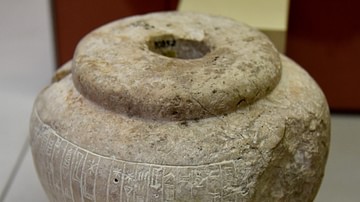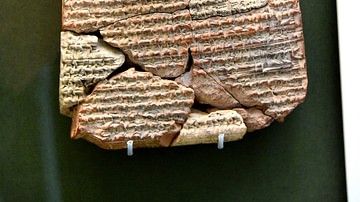Search
Search Results

Definition
Babylon
Babylon is the most famous city from ancient Mesopotamia whose ruins lie in modern-day Iraq 59 miles (94 km) southwest of Baghdad. The name is derived from bav-il or bav-ilim, which in Akkadian meant "Gate of God" (or "Gate of the Gods"...

Definition
Mesopotamian Government - Helping and Serving the Gods
Ancient Mesopotamian government was based on the understanding that human beings were created to help and serve the gods. The high priest, king, assembly of elders, governors, and any other officials were recognized as stewards chosen by...

Definition
Mesopotamian Art and Architecture - The Birth of Art and Architecture in the Ancient World
Ancient Mesopotamian art and architectural works are among the oldest in the world, dating back over 7,000 years. The works first appear in northern Mesopotamia prior to the Ubaid period (circa 6500-4000 BCE) and then developed in the south...

Definition
Gutians
The Gutians were a West Asiatic people who are thought to have lived around the Zagros Mountains in a region referred to as Gutium. They had no written language and all that is known of them comes from their enemies, including the Akkadians...

Definition
Cambyses II
Cambyses II (r. 530-522 BCE) was the second king of the Achaemenid Empire. The Greek historian Herodotus portrays Cambyses as a mad king who committed many acts of sacrilege during his stay in Egypt, including the slaying of the sacred Apis...

Definition
Archaeology
Archaeology is a wide subject and definitions can vary, but broadly, it is the study of the culture and history of past peoples and their societies by uncovering and studying their material remains, i.e. tools, ruins, and pottery. Archaeology...

Definition
Arabia
The ancient Arabians, or Arabes as they were called by the Hellenes, were a Semitic people. One must note that the Arabians were not a single people but multiple smaller kingdoms and tribes. Arabia was home to great city builders and nomads...

Definition
Pasargadae
Pasargadae was one of the oldest residences of the Achaemenid kings, founded by Cyrus the Great (r.559-530). It resembled a park of 2x3 km in which several monumental buildings were to be seen. According to the Roman geographer Strabo of...

Article
Dadan, Tayma, Khaybar, Qurh & Old Town AlUla - More Stunning Sites at AlUla, Saudi Arabia
Khaybar, Tayma, Dadan, Qurh, and AlUla Old Town are sites situated in the AlUla region of Saudi Arabia, an area on the ancient incense trade routes. Khaybar and Tayma are both multiperiod oasis sites, whilst Dadan was once the capital of...

Image
Medical Recipes from Borsippa Against Mental Disorders
Alongside recipes (derived from various plants) to address mental illnesses, this tablet provides unique drawings as a guide to making magical figurines against demons and sickness. The king-like figure on the throne resembles an image of...